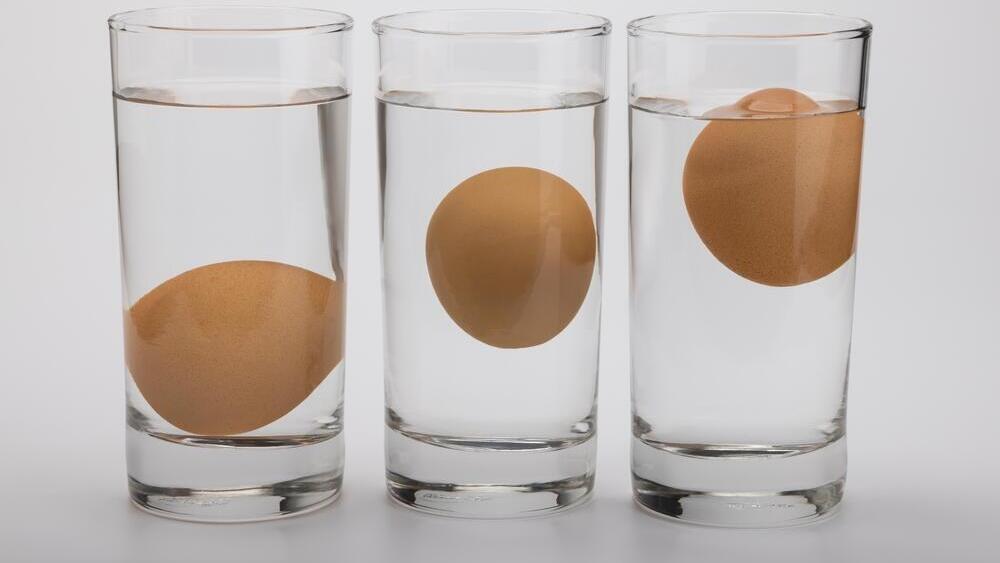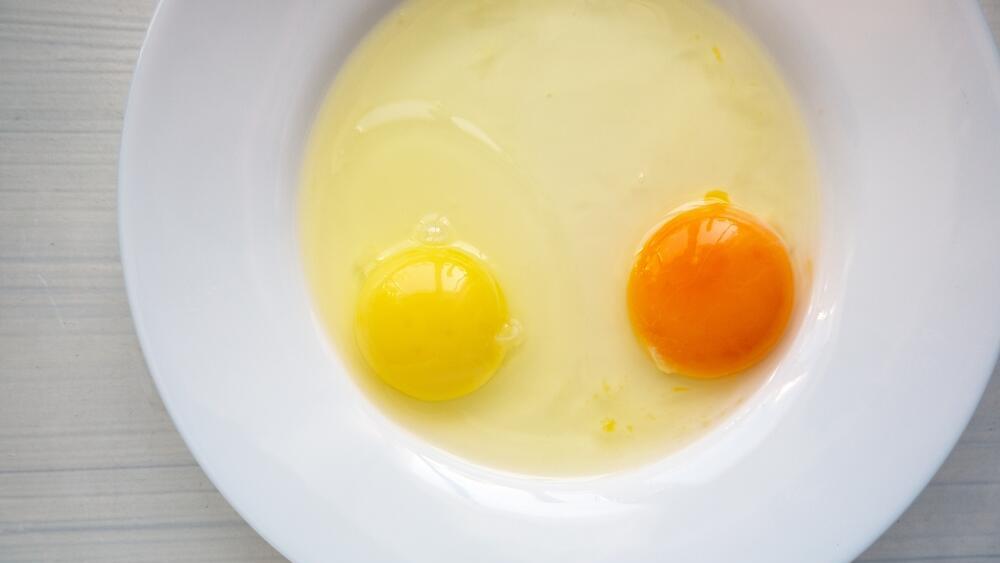Getting your Trinity Audio player ready...
Eggs are one of the most popular foods, but how much do we really know about choosing between different types, how much to eat, and how to select the freshest ones?
Tamar Shamir-Berenholtz, deputy director of the nutrition unit at Clalit Health Services in the Jerusalem district, explains that eggs are an excellent source of complete protein because the protein in eggs contains all the essential amino acids, which are the building blocks necessary for protein synthesis in the body. The egg white contains almost 100% complete protein, while the yolk is rich in important vitamins like A, D, and B12, as well as other essential minerals.
How can we tell if an egg is fresh?
A simple method for checking the freshness of an egg is the "water test." You can easily try it at home: fill a glass with water and place the egg in it. Fresh eggs will sink to the bottom and stay there, while older eggs may start to float. This happens because, as eggs age, the egg white breaks down, moisture escapes, and air enters. However, while this test can offer a general idea of an egg’s freshness, Shamir-Berenholtz advises not to rely on it exclusively.
"It’s important to buy eggs from a reputable source and ensure they are of high quality. Also, make sure to check the expiration date, which is marked on every egg carton. This is a key indicator of the egg's quality," she says. "Even if eggs appear 'fine' on the outside, it's not recommended to consume them after their expiration date. The water test is helpful, but it shouldn’t be your only tool."
Which is healthier, the egg white or the yolk?
"While the yolk does contain fat, it also contains essential nutrients, so it’s not advisable to completely avoid it," says Shamir-Berenholtz. "Especially given the general recommendation to consume no more than one egg per day. It's important to note that although eggs contain cholesterol, they don’t negatively affect the health of most people. The restriction on egg consumption mainly applies to individuals with medical conditions like diabetes or heart disease." A medium-sized egg weighs around 60 grams and contains about 7 grams of protein and 90 calories, making it a low-calorie food. If you're consuming more than one egg, you could consider limiting the number of yolks, but it’s not necessary to eliminate them altogether, as they provide essential nutrients.
It’s also worth noting that the U.S. Food and Drug Administration (FDA) recently updated its list of healthy foods, for the first time recognizing eggs as a healthy food recommended for daily consumption. This change is based on research and data collected over the years, which show that eggs have nutritional values that contribute positively to human health.
Does the color of the shell indicate nutritional value?
Eggshells can come in various colors, depending on the breed of the hen. The most common colors are white and brown, with white hens laying white eggs and brown hens laying brown ones. There are also less common breeds of hens whose eggs have blue, gray, or green shells. What’s important to know is that the color of the eggshell is caused by different pigments produced by the hen and does not correlate with the nutritional value of the egg itself.
Get the Ynetnews app on your smartphone: Google Play: https://bit.ly/4eJ37pE | Apple App Store: https://bit.ly/3ZL7iNv
The yolk's color can vary from egg to egg and is mainly influenced by the hen's diet. When hens consume more natural pigments, such as carotenoids found in grasses, colorful vegetables, or corn, the yolk will be a deeper orange. Conversely, hens fed a diet low in carotenoids will lay eggs with a more yellow yolk. Additionally, some food industries use natural food coloring to alter the color of the yolk.
“It’s important to note that the yolk’s color does not affect the nutritional value of the egg. It’s not related to the amount of protein, vitamins, or minerals in the egg; it’s simply a reflection of the hen’s diet and lifestyle,” explains Shamir-Berenholtz.
Do eggs need to be refrigerated?
Eggs are covered by a natural protective layer from the moment they are laid. This thin but strong protective layer coats the shell and acts as a barrier against bacteria and contaminants while also preventing moisture loss from the egg. This protection remains intact as long as the egg’s shell is not broken or cracked. If eggs are stored at too high a temperature, or if their protective layer is compromised, bacteria can enter the egg, leading to potential contamination or spoilage. Due to the warm climate in Israel, it’s recommended to store eggs in the refrigerator to preserve their freshness and prevent bacterial growth. A cooler temperature helps slow the spread of bacteria such as salmonella, which can cause food poisoning. Refrigerating eggs also helps maintain their quality over time.
In cases where eggs are stored outside the fridge, especially in hot climates, they are likely to lose freshness more quickly, and the protective layer may be damaged by contact with water or external contaminants. Therefore, in hot weather or when eggs won’t be consumed soon, refrigeration is a crucial step for ensuring food safety.
“The Health Ministry recommends keeping eggs in the refrigerator,” says Shamir-Berenholtz. “This is especially important since eggs undergo a process before reaching stores. Unlike eggs from backyard hens, eggs bought in supermarkets have been treated and preserved, so it's important to refrigerate them after purchase.”
She also advises that "if you find a broken or damaged egg in the carton, discard it immediately, as contaminants could enter through the cracked shell. It's also important not to wash eggs with water, as the water may remove the natural protective layer on the shell, allowing bacteria to enter."
Are free-range eggs healthier?
“It’s important to understand the difference between free-range eggs and 'regular' eggs. Regular eggs come from hens in conventional battery cages, where animal rights organizations oppose their conditions due to overcrowding and other factors,” explains Shamir-Berenholtz. "Free-range eggs come from hens that are not confined to small cages, but they are usually kept in large pens or warehouses, not roaming freely in pastures. In rare cases, some hens are allowed to roam outdoors on grass, but this is uncommon in Israel."
“When it comes to nutritional value, there’s no significant difference between free-range eggs and regular eggs,” she says. "There might be slightly more contamination in regular eggs due to the cramped living conditions of the hens, but this is not a major concern, especially when the eggs are cooked properly. The most important factor in avoiding contamination is how you cook the eggs."
Shamir-Berenholtz advises against consuming raw eggs without cooking them in some way, as cooking kills harmful bacteria like salmonella. She also notes that regular eggs are much cheaper than free-range eggs, and there’s no nutritional difference between them. “Regardless of the type of egg, we still get the same nutritional benefits,” she concludes.
Affordable and easy protein: Who said eggs are only for breakfast or dinner?
They can be incorporated into meals at any time of day, even at lunch. While in Israel, lunch is typically the main meal of the day, often featuring meat, chicken, or fish with a side, sometimes preparing a dish with eggs can be a simple and convenient solution.
"Eggs are an excellent source of complete protein," says Shamir-Berenholtz. "It’s easy to take an egg to work as part of your daily protein intake, add it to a salad, or incorporate it into a stew, cake, or more. You can easily make it part of your lunch. Sometimes people don't want to bring fish or meat to work due to odors or other reasons, but eggs are easier in that regard. They also help those who don’t cook often or didn’t have time to prepare a lunch."
In addition, eggs remain relatively inexpensive compared to other protein sources like meat or chicken, making them an affordable and healthy choice for many. “If you’re making an omelet, it’s best to use olive oil or canola oil, not butter or margarine,” advises Shamir-Berenholtz.






